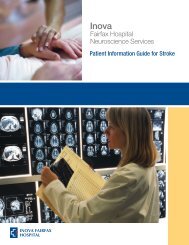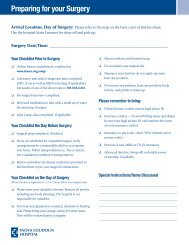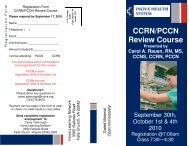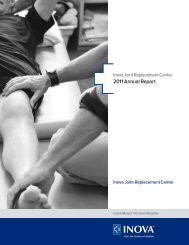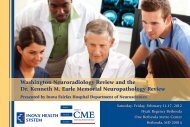Fungal and Parasitic Infections of the CNS - Inova Health System
Fungal and Parasitic Infections of the CNS - Inova Health System
Fungal and Parasitic Infections of the CNS - Inova Health System
You also want an ePaper? Increase the reach of your titles
YUMPU automatically turns print PDFs into web optimized ePapers that Google loves.
Balamuthia m<strong>and</strong>rillaris<br />
• Children 4 months to 23 years<br />
affected by free living soil ameba,<br />
immunodeficiency has not clearly<br />
played a role in pediatric cases<br />
versus adults<br />
• Can be definitively differentiated<br />
from Acanthamoeba only by<br />
antibodies<br />
• Responsible for sporadic<br />
meningoencephalitis with<br />
mortality rates near 100%<br />
• 2001: About 200 cases reported<br />
worldwide.<br />
• Spreads hematogenously from<br />
cutaneous, ocular, or pulmonary<br />
lesion to <strong>the</strong> <strong>CNS</strong><br />
• In <strong>CNS</strong>, vasculitis dominates<br />
clinical picture<br />
• Death within 6-8 weeks <strong>of</strong><br />
diagnosis<br />
<strong>CNS</strong> Protozoal infections: Malaria<br />
• <strong>CNS</strong> involvement seen<br />
with only one species,<br />
Plasmodium falciparum<br />
• Mortality in some parts <strong>of</strong><br />
<strong>the</strong> world 20-50%,<br />
especially infants <strong>and</strong><br />
children<br />
• Well-nourished individuals<br />
more susceptible than<br />
malnourished ones in<br />
Africa, related to body iron<br />
status<br />
• Infection common in<br />
pregnancy, possibly<br />
related to relative<br />
immunosuppression<br />
• Steroid administration<br />
predisposes to severe<br />
infection: A TOUCH OF O<br />
<strong>CNS</strong> Protozoal infections:<br />
Trypanosoma brucei & cruzi<br />
• African T. brucei<br />
• South American<br />
trypanosomiasis<br />
(Chagas disease) commonly<br />
involves autonomic nervous<br />
system, cause <strong>of</strong> <strong>the</strong> underlying<br />
megasyndromes. Protozoa has<br />
proclivity for infecting muscle<br />
– <strong>CNS</strong> involvement clinically<br />
not common<br />
– Acute form <strong>of</strong> disease<br />
occurs in children under<br />
age 1 yr.; protozoa infects<br />
astrocytes <strong>and</strong> endo<strong>the</strong>lium<br />
<strong>of</strong> cerebral blood vessels<br />
– Chronic form occurs in<br />
10% <strong>of</strong> cases<br />
– Disease well known to be<br />
severe in patients with<br />
AIDS <strong>and</strong> as a congenital<br />
disease, underscoring P+O<br />
biology <strong>of</strong> some protozoa<br />
29




